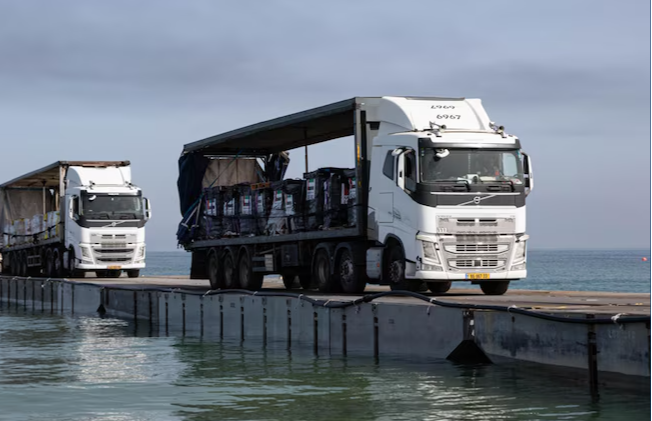
It was completed (almost) on schedule and “in the nick of time” as aid agencies were running out of food, fuel and critical medical supplies and as military operations in Rafah, where more than 1.4 million Palestinians are sheltering, threatened to disastrously worsen the humanitarian crisis in that unfortunate strip of land.
As far as we know, its construction stayed within the $320 million budget.
It saw the first trucks carrying humanitarian assistance move ashore into Gaza on May 17.

Most important — since then and until it encountered some setbacks — it has facilitated the delivery of over 1,000 metric tons of desperately needed humanitarian aid to the suffering people of Gaza.
By “it” we are of course referring to the U.S. Central Command (CENTCOM) JLOTS, or “Joint Logistics Over-the-Shore” project consisting of a floating dock about three miles off the Gaza shore, a floating pier attached to an approximately 1,800-foot-long modular causeway anchored to the shore and, finally, a group of logistic support vessels (LSVs) to transport the humanitarian aid from the dock to the pier/causeway.
JLOTS would permit the delivery of up to 2,000,000 meals per day for Gaza’s 2.3 million people, with an eventual daily transport of 150 truckloads of aid.
However, over the May 25 weekend, rough seas caused four vessels that are used to stabilize the floating pier to break free from their anchors and become beached after losing power. Two vessels were beached in Gaza near the base of the pier and two were beached near Ashkelon in Israel.
Three days later, a portion of the trident pier that was anchored into the Gaza coastline was damaged in heavy seas, “necessitating a need to rebuild and repair it” according to Pentagon spokeswoman Sabrina Singh.
The pier was removed from its location on the Gaza coast and taken to the Israeli port of Ashdod where it is being repaired and reassembled by CENTCOM.
U.S. officials expect that the pier will be reinstalled and working again next week.
The JLOTS project has not been without other setbacks, criticism and controversy.
Republican members of the Senate Armed Services Committee have voiced “strong reservations” about the “significant risk” the mission entails to U.S. personnel as they will be “working near active fighting between Israel Defense Forces and Hamas militants.”
Commenting on the cost of the JLOTS construction project, Senator Roger Wicker, the top Republican on the Democratic-led Senate Armed Services Committee, told Reuters, “This dangerous effort with marginal benefit will now cost the American taxpayers at least $320 million to operate the pier for only 90 days.”
When asked whether JLOTS is worth the $320 million price tag, Pentagon spokeswoman Sabrina Singh emphasized how much aid has already passed through the pier in just a short period of time. “… [I]t’s pretty important for the people that are suffering right now — that are in a dire humanitarian situation — to get whatever aid they can, by whatever means,” she said.
Crowds of desperate Palestinians have overrun trucks coming from the pier and looted their cargo. In one incident, a Palestinian man was shot dead. Deliveries were halted for two days.
Unrelated to the latest heavy seas damage to the pier, three U.S. service members suffered non-combat injuries at sea.
There have been other critical reports on the JLOTS project. In a piece at The Hill titled “The failed Gaza pier proves our military isn’t prepared for extreme weather,” Tim Gallaudet writes:
The impacts from heavy weather on the Gaza pier operation were predictable and should have been prevented with proper planning. The U.S. must learn from this mistake and improve how it considers environmental conditions in planning and executing operational logistics.
Even aid groups have had “mixed reactions” according to the Associated Press, “both welcoming any amount of aid for starving Palestinians besieged by the nearly eight-month-old Israel-Hamas war and decrying the pier as a distraction that took pressure off Israel to open more border crossings, which are far more productive.”
Perhaps national security spokesman John Kirby said it best: “Nobody said at the outset that it was going to be a panacea for all the humanitarian assistance problems that still exist in Gaza…I think sometimes there’s an expectation of the U.S. military — because they’re so good — that everything that they touch is just going to turn to gold in an instant.”
















